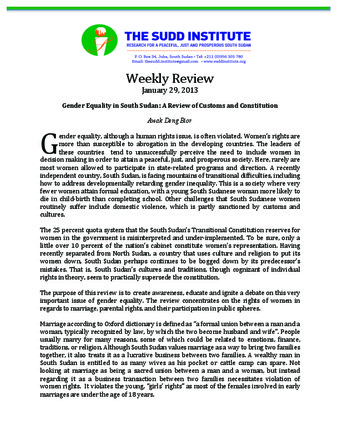Gender Equality in South Sudan: A Review of Customs and Constitution
Publication Summary
Gender equality, although a human rights issue, is often violated. Women’s rights are more than susceptible to abrogation in the developing countries. The leaders of these countries tend to unsuccessfully perceive the need to include women in decision making in order to attain a peaceful, just, and prosperous society. Here, rarely are most women allowed to participate in state-related programs and direction. A recently independent country, South Sudan, is facing mountains of transitional difficulties, including how to address developmentally retarding gender inequality. This is a society where very fewer women attain formal education, with a young South Sudanese woman more likely to die in child-birth than completing school. Other challenges that South Sudanese women routinely suffer include domestic violence, which is partly sanctioned by customs and cultures.
The purpose of this review is to create awareness, educate and ignite a debate on this very important issue of gender equality. The review concentrates on the rights of women in regards to marriage, parental rights, and their participation in public spheres.
Awak Deng Bior is a deputy administrator at the Sudd Institute. Awak has experience in documenting, tracking, reporting, monitoring, and evaluation. As well, Awak has a B.A in Biology from the University of Texas at Dallas and is the founder of cushaids.org, an informative website that provides HIV/AIDS awareness among South Sudanese.
Awak is currently on a study leave.

